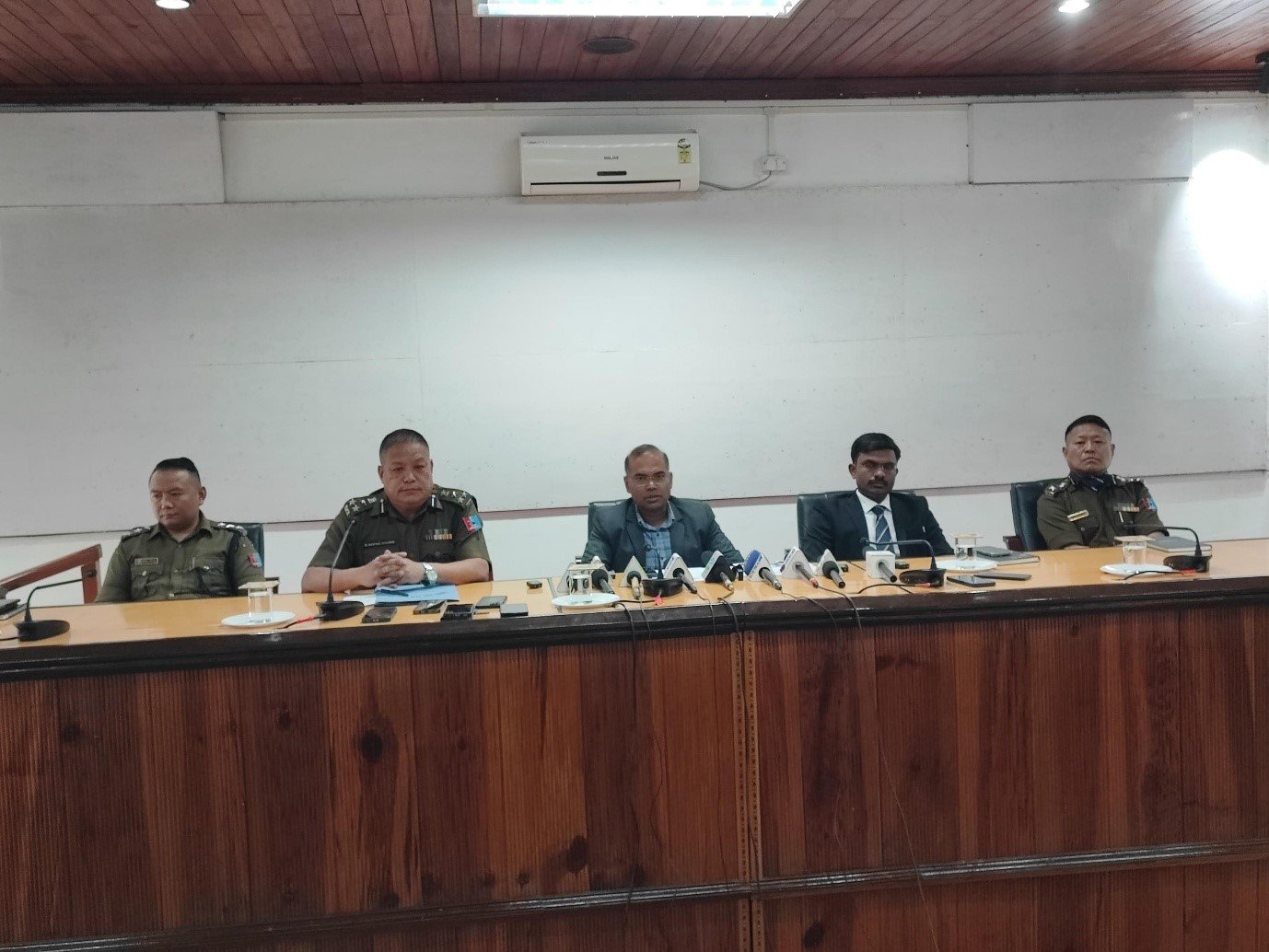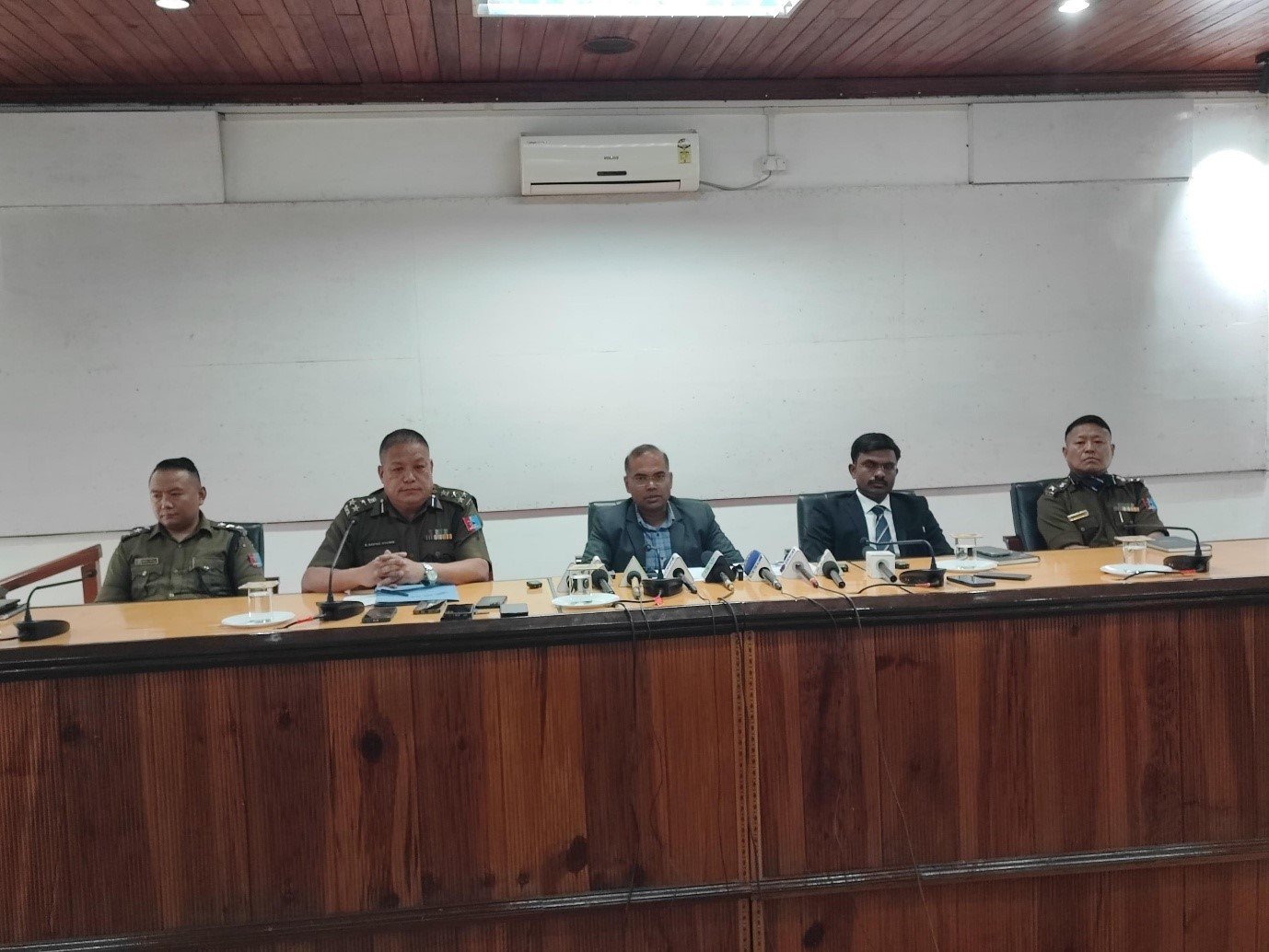Nagaland Police has ramped up its operations against drug trafficking, registering 199 narcotics cases in 2024 and arresting 343 individuals, including some 60 major traffickers detained under the Narcotic Drugs and Psychotropic Substances (NDPS) Act.
Addressing a press conference at Rhododendron Hall, Police Complex, Chümoukedima, on February 5, 2025, IGP (CID) Nagaland, Vikram Khalate, IPS, highlighted the police department’s unwavering commitment to tackling the menace of drug trafficking.
In just the first two weeks of January 2025, police have already registered seven new cases—three in Dimapur and four in Kohima—leading to the arrest of 18 individuals (14 males and 4 females).
During these operations, police confiscated 203 soap cases containing a total of 2.375 kg of heroin, with an estimated market value of over Rs. 8.31 crore. Each soap case typically contains 10 to 13 grams of heroin.
Nagaland: A Key Transit Route for Narcotics
IGP Khalate reiterated that Nagaland remains a crucial transit hub for drug trafficking, with most narcotics originating from Manipur before being smuggled into Assam, Karnataka, Punjab, and other states. Recent investigations have revealed a shift in trafficking methods, with criminals modifying private vehicles by adding concealed compartments to evade detection.
“We have put multiple systems in place that allow our teams to analyze and operate in real-time,” Khalate said, adding that Nagaland Police is committed to eliminating drug trafficking and cybercrime.
He appealed to the public to report any suspected drug-related activities to the nearest Police Station or the Narcotics Police Station, PHQ.

Apart from narcotics enforcement, cybercrime has emerged as a growing concern in Nagaland. Criminals are increasingly exploiting digital platforms to commit fraud, including:
-Fraudulent job offers
-Sextortion and blackmail
-Fake bank rewards and phishing scams
-Online financial fraud
IGP Khalate urged the public to remain vigilant, avoid clicking on suspicious links, and refrain from sharing personal or financial details online. He advised victims of cyber fraud to immediately call the Cybercrime Helpline (1930) to block fraudulent transactions and prevent further financial loss.
Commissioner of Police (CP) Dimapur, Kevithuto Sophie, stressed the police department’s dedication to Nagaland’s “War Against Drugs” initiative, which has been actively enforced for the past two years.
“We have made significant strides in curbing drug-related crimes. Under the dynamic leadership of the ADGP, who is deeply committed to eliminating drug trafficking, we have intensified our crackdowns,” CP Sophie stated.
He further revealed that drug trafficking patterns have shifted in the last six months due to the police’s intensified operations. Traffickers are now hesitant to bring drugs directly into Nagaland. Instead, drug users from Dimapur and surrounding areas are traveling to Khatkhati, Lahorijan, and Manja in Assam to procure narcotics.
“We have developed our sources, and public cooperation has been crucial. However, people often visit police offices with vague concerns. Specific and clear information is necessary for effective action,” Sophie emphasized.
He reassured citizens that their identities would be protected when they provide intelligence to the police.
Download Nagaland Tribune app on Google Play

CP Sophie called on the public to remain vigilant and report any suspicious activities involving drug transactions. He assured that police officers’ contact numbers—from the Officer-in-Charge (OC) to the Commissioner of Police (CP)—are prominently displayed in key locations across Dimapur, Chümoukedima, and Niuland for easy access.
“The fight against drugs is not just the responsibility of law enforcement but of the entire community. Only through collective efforts can we create a drug-free Nagaland,” CP Sophie stated.

SP Narcotics, Suresh Shinde, provided insights into Nagaland’s role as a transit route for drug trafficking, with most illicit consignments entering from Manipur and being transported to states like Punjab, Karnataka, and others.
He warned the public about a new deceptive tactic used by traffickers:
“In some cases, traffickers offer unsuspecting individuals Rs. 8,000 to Rs. 10,000 to drive a vehicle from Kuzama Check Gate to Dimapur. Many agree without realizing that drugs are concealed inside the vehicle,” he said.
Once caught, individuals face severe legal consequences, he cautioned.
SP Shinde also highlighted the growing challenge of concealing drugs, pointing out that certain substances, such as ‘sunflower’, can be easily hidden in small compartments.
SP stressed “Public intelligence is crucial in tackling drug trafficking.” The Director General of Police (DGP) has assured that informants will not only be rewarded but also have their identities kept confidential.
Nagaland Police Strengthens Intelligence Network
ACP Chümoukedima, Ninoto I Zhimomi, emphasized the significant progress made in intelligence gathering by Nagaland Police.
“Until recently, law enforcement agencies relied entirely on external intelligence sources. Now, under the leadership of Police Headquarters (PHQ), we have successfully built our own intelligence-gathering network,” he said.
With enhanced surveillance techniques, stronger coordination, and modern technology, Nagaland Police can now independently track illicit drug activities, allowing for more provident law enforcement.
ACP Zhimomi highlighted recent successful operations, crediting them to the police force’s growing intelligence network.
“These successful missions have boosted confidence among officers and personnel. With the right leadership, strategic planning, and dedication, we can take on drug traffickers head-on,” he affirmed.
SP Shinde proudly announced that one officer from the narcotics division was awarded the President’s Medal last year for his meritorious service in seizing large quantities of narcotics.
Several officers from the Kohima Narcotics Cell also received recognition for executing major drug busts, many of which were based on public tip-offs.
“The dedication of our officers in the field has been instrumental in making significant drug seizures. We encourage citizens to continue supporting law enforcement by providing precise and actionable intelligence,” Shinde said.
Nagaland Police reaffirmed its commitment to eliminating drug trafficking and cybercrime, working in close coordination with law enforcement agencies and the public to ensure a safer society.
IGP Khalate extended his heartfelt gratitude to the citizens of Nagaland for their support and cooperation. “Together, we can build a drug-free and crime-free future for our state,” he said.
For any information related to drug trafficking or cybercrime, citizens are urged to report it to their nearest police station or call the Cybercrime Helpline (1930).

